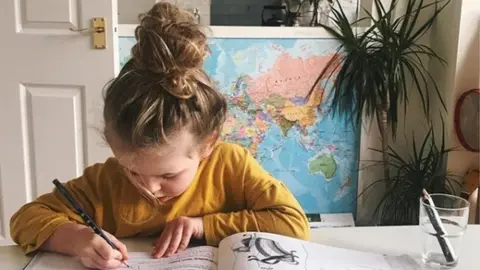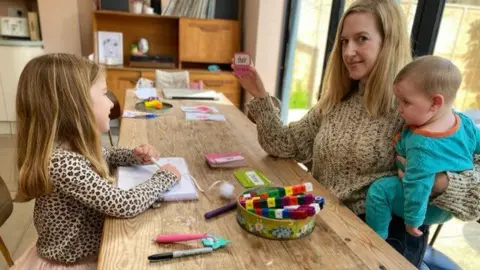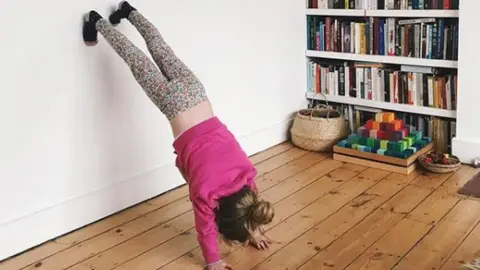Coronavirus: How families can cope with self-isolating together
 Instagram/@mightymother_
Instagram/@mightymother_“Whether you’re living in a massive six bedroom house or all sharing a smaller two-bed flat, we’re all going to feel the walls closing in a little bit more,” says Eloise Rickman, who runs courses on home-schooling.
Feeling cooped up might be just one of several potential knock-on effects as more families self-isolate together following the coronavirus outbreak.
The government’s current advice is that if anyone develops symptoms, everyone they live with must self-isolate. And now schools in the UK are to close over coming days for most children.
Among the families in quarantine are Annie Ridout, 34, her husband and their three young children. Two of her children have developed symptoms.
“It’s a very weird time,” she said. “We are focusing on getting through it and being as upbeat as we can.”
Ms Ridout, who teaches online courses for freelancers and entrepreneurs, says she has created a daily schedule for her school-age children.
“An hour of maths, my husband has been doing that in the morning. And then an hour of reading and writing. There will be creative time, artwork, and then time in the garden, digging and getting muddy. And that will be it.”
 Annie Ridout
Annie RidoutShe says originally she planned a schedule with 30-minute chunks, but it’s now less rigid and more focused on ticking off tasks each day. “We had to loosen up in terms of accepting they are going to watch telly,” she says.
Ms Rickman, from south London, agrees that a schedule is important - especially for children who are already at nursery or school and will be used to routine.
“Children really thrive on predictability, especially when life is changing around them,” she says.
But the 31-year-old, who already home-schools her children, stresses that any schedule should be more like a “flow” - rather than something strict.
She suggests creating weekly or daily activities and then read the plan out or “stick it on the wall”.
“Maybe Wednesdays have a family film afternoon. Or give teenagers some private time to Skype their friends,” she suggests.
Educational psychologist Zubeida Dasgupta also stressed the importance of structure, from her home in Brighton and Hove where she and her family are also currently self-isolating.
“We know when people are faced with uncertainty or worry, having some certainties, for example through a bit of structure, could really help,” she says.
“Although on the face of it, some children may feel excited by being off school, the reality is weeks - or months - on end playing Xbox and watching movies may not be as fun as we think.
“It’s about getting a balance - having a structure and integrating some fun,” she says. “It might be helpful to think about how we distinguish weekdays and weekends.”
In terms of schoolwork, some schools and teachers have already spoken about the possibility of setting work for pupils to access online.
The current health crisis is certainly a “unique situation” for schooling, says Ms Rickman.
“For parents who are suddenly plunged into it, I think it could be a challenge.”
 Instagram/@MightyMother_
Instagram/@MightyMother_But she adds: “I have had a few messages from families who said they have always wanted to try home-schooling and are looking forward to doing it for the first time.”
She says the most important thing in home-schooling is family relationships. A lot of siblings will not be used to being together all day, and “that’s a lovely opportunity to build and strengthen your family relationships - but it will come with some bumps in the road”.
She suggests parents try and carve out some one-on-one time with the children.
Thinking about the environment is also important, she says - but “this is not about setting up a classroom in the living room”.
She suggests making spaces for children to do arts or craft - for example covering a coffee table with newspaper and arranging pens in mugs - and even moving furniture.
“If you don’t want the kids looking at the TV for five hours a day, think do we need to rejig the furniture? Do we want to think about pushing tables back so the kids have space to run about, especially if you have a flat.”
"This is a time we need to prepare for our houses to be a bit messier. Having kids about all day, it’s going to get messy.”
And she says learning at home is not simply replicating school at home. It’s not necessary to do six hours of learning like in school, she says, as lessons will be one-on-one and so more intense.

- EASY STEPS: How to keep safe
- A SIMPLE GUIDE: What are the symptoms?
- TRAVEL PLANS: What are your rights?
- IN-DEPTH: Coronavirus pandemic

But it’s not just the children who may be impacted as whole families in isolation. Parents too could find it a challenge.
Spending hours on end every day with your children can be difficult, says Ms Rickman. She says the first piece of advice she would give to parents who are with their children at home is to “think about yourself first”.
“Our children respond so much to ourselves and our leadership,” she says. “Especially now when things are being disrupted. I would say as a parent the best thing to focus on before you go down rabbit holes looking for curriculum is to think about how to support yourself first because you are that bedrock.
“Even just opening a window and taking 10 deep breaths, doing a free three-minute meditation or writing down 10 things you’re grateful for. And things like limiting how much news you’re taking in in a day”
The advice for parents is also reiterated by educational psychologist Ms Dasgupta.
“People need space and time on their own”, she says, urging families to have conversations to negotiate uninterrupted time alone.
Ms Dasgupta says social contact with the outside world is also vital, as well as exercise, such as going for a walk where you won't bump into anyone. If you are self-isolating after having symptoms, the NHS advises not going for a walk.
“Being together could feel a little like cabin fever, not just being in the space for so long but also interacting only with the people in your immediate family," says Ms Dasgupta. "Thank God for being able to Skype and WhatsApp.”
But there are positives, she adds.
“I suppose the positives are we can spend some time together, some nice, unhurried time. We don’t have to get to places and juggle all the different commitments.
“You can slow down. It can help you enjoy the moment a little bit more."
